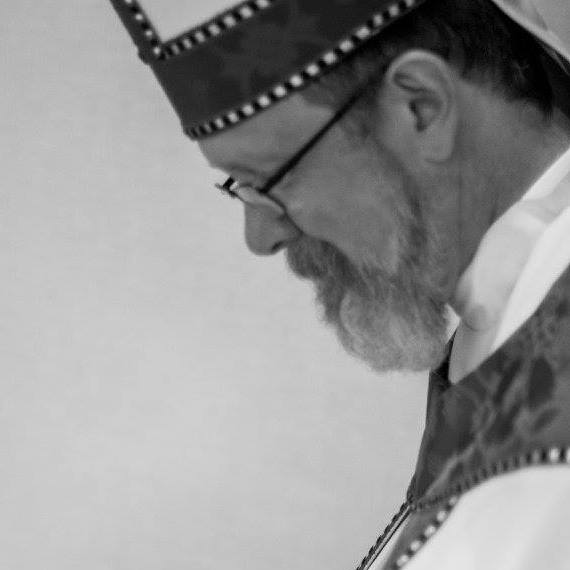- Bishop-for-Life James Heiser has church property owned by the LCMS, from 1922 until 2004, when they left the LCMS and kept the real estate.
- Baptist Trained Kent Heimbigner has an enormous church from the LCMS. Its "history" begins in 2009, when they left the LCMS and took the property. The LCMS started the church in 1975.
- Pastor Paul Rydecki has a large property from the WELS, which began the parish in 1987. Many left the parish over UOJ and the remainder joined ELDONA in 2012.
Apart obtaining these properties by leaving the synod that bought and built them, these men did not buy or build much of anything. ELDONA has almost no real estate of its own. Pastor Hudson has a small church they actually built.
Pastor Josh Sullivan went on YouTube to defend Episcopal government.
Pastor Josh Sullivan went on YouTube to defend Episcopal government.
 |
| St. Ignatius Seminary, ELDONA was not named after the founder of the Jesuits, but after Ignatius of Antioch. Drawings of the new addition were not available. |
As I wrote before, the priests of ELDONA are mostly from the Ft. Wayne LCMS seminary, which remains a champion of Universal Objective Justification. This practical seminary was created for those with inadequate preparation for the ministry and light requirements in Greek and Hebrew.
Jay Webber also studied at Ft. Wayne but was not approved for LCMS ordination, so Robert Preus got him into the ELS. Ft. Wayne has been a nest of Eastern Orthodoxy and Roman fanaticism, more EO than Rome, it seems. However, Robert Preus wrote Justification and Rome to combat the Romanism he saw around him.
Ft. Wayne graduates bullies who feel insecure about their inadequate training and long to be as pompous and threatening as their hero David Scaer.
 |
| Ft. Wayne is the School of Peacocks, strutting around in their majesty peacock robes, but betraying themselves with their harsh and raucous voices. |
Thus ELDONA is populated by MDiv graduates who wish to teach the entire world while lacking the academic requirements for the teaching office, which the Reformation insisted upon. For Chemnitz to be a bishop, a real doctorate was required - and he earned the degree.
More importantly, the Lutheran Reformation made its points always from the Scriptures, starting and ending there with occasional references to the early Church Fathers. If one looks at the Church Fathers set of books, they are enormous in volume, enough to let anyone pick a topic and find support for it.
Church government is lightly treated in the New Testament, and the term we translate as bishop really means "supervisor," not Prince of the Church.
The video above, by ELDONA priest Josh Sullivan, shows how they defend their Episcopal governance by starting with St. Ignatius. That may answer the question: "Why is their seminary with one student (a son-in-law) named St. Ignatius?"
Father Sullivan acknowledges that the St. Ignatius model is man-made, but he gives it two thumbs up. His division of church government into three categories is debatable too, but that is another matter.
St. Ignatius said it, and I believe it! But why? From Ignatius, Sullivan works back to the Pauline Epistles, but there are few bricks and mortar to build up what man creates with that one title - supervisor. Epi-skopos - to look over, a supervisor, not one who rules over and dictates to others.
From St. Paul, Sullivan leaps to the Reformation and Melanchthon. at least distinguishing the Preaching Office from man's model for governance.
Another annoyance from the Synodical Conference veterans is the Roman style emphasis on the "Holy Office of the Ministry" while preaching against the Chief Article, Justification by Faith. ELDONA existed for a long time before discovering and defending the Chief Article. They were happy to be in fellowship with the Rolf Preus Synod, with or without Rolf. Nowhere is UOJ more concentrated than the Rolf Preus Synod, perhaps even more than in ELCA.
This video is rather lame in promoting Bishop-for-Life Heiser's desire to be another control-freak bishop. Everyone must agree with Bishop Heiser, even the details of worship and the robes they wear. The ELDONUTs deny this and yet also admit it.
Like all false teachers, Heiser sent himself. He wanted to be a bishop after the thrill of working with Bishop-for-Life Randy DeJaynes in the short-lived - in fellowship with ELS/WELS - Lutheran Confessional (sic) Synod.
Heiser later gathered pastors who submitted to his episcopal hobby first, and then had himself appointed to the office he sought for years.
I have no problem with the title bishop, but I do with the pretensions, whether they come from District Presidents, their fawning Circuit Pastors, or some other title.
I still agree with the 19th century Lutheran sociologist J. H. W. Stuckenberg. He taught that power was not taken but given. That is apparent in all the bullying and threats accepted in Lutheran bodies today, from the largest to the dinkiest. Congregations can call any qualified man they want, but they are told which ones they really can call - or which one. One LCA bishop would not give a congregation a pastor until they called him. They voted him down, so he refused to give them anyone else. They finally surrendered their power. He wanted to be in his daughter's congregation. That was Lotz in Ontario. Thus with controlling the call they control all the congregations through the servile pastors.
Likewise, only ELDONA pastors are members of ELDONA. The congregations are not. If they have any kind of ELDONA meeting, no one can attend except certified, homogenized, pasteurized ELDONUT priests.
 |
| That is one spooky photo rendition of Bishop-for-Life James Heiser, one He picked Himself. |





